#ofcom report
Explore tagged Tumblr posts
Text
📱 Online Safety Alert: 1 in 4 Kids Aged 5–7 Own Smartphones
According to a recent Ofcom report, almost a quarter of children aged 5 to 7 in the UK now own a smartphone. Let that sink in — kids barely out of preschool are stepping into the digital world, unsupervised in many cases.
The footage from John Wallis Academy in Kent shows what’s becoming an everyday scene: groups of very young children clustered around their screens, even during break time. And while this might seem like “just the times we live in,” it raises serious questions about online safety, digital literacy, and the kind of content these children may be exposed to.
With smartphones come access to the internet, social media, YouTube, and messaging apps — environments not built with a 6-year-old in mind.
🌐 It’s time we rethink our approach to digital parenting. 🧒 Should a 6-year-old really need a smartphone? 🔒 Are we giving them tools without teaching them the rules?
If you're a parent, teacher, or just someone concerned with the next generation's mental and digital well-being, this is your reminder: supervision and education are more critical than ever.
Need help managing educational balance or crafting assignments in child development and safeguarding? 👉 CIPD Assignment Help has expert guidance.
#online safety#children and technology#smartphone use#parenting in the digital age#ofcom report#john wallis academy#UK schools#kids and screen time#child development#digital parenting#early tech exposure#safe internet for kids#education news#tumblr trending#tech and kids#digital wellbeing
1 note
·
View note
Text
Working Class audiences and the BBC
Working Class audiences and the BBC
According to the latest research from Ofcom class audiences want the BBC to take more risks when producing new programmes. Apart from an excuse to call out to The Class Sketch from The Frost Report (as shown above — John Cleese, Ronnie Barker, Ronnie Corbett), it’s interesting to unpick this. Class in the UK In the ’60s, we had a shorthand in the UK of a three-class system (upper, middle and…
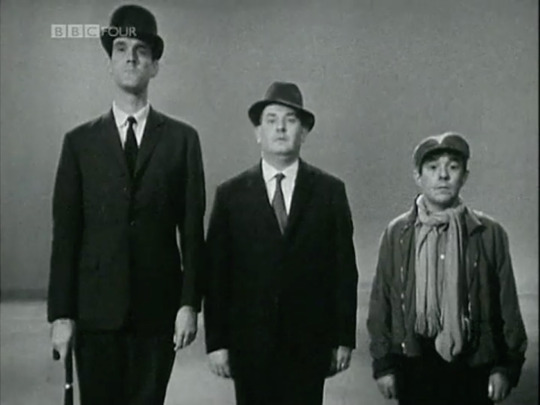
View On WordPress
1 note
·
View note
Text
She took her hair down and they didn't show us, Reporting them to ofcom
21 notes
·
View notes
Text
A new report by Ofcom and anti-discrimination group Kick It Out has thrown its weight behind a growing campaign to restrict online speech in the UK, even when that speech breaks no laws.
Backed by the government and tied to powers granted under the Online Safety Act, the document marks a significant moment in the institutional push to transform what is currently legal expression into material subject to moderation, suppression, and even criminal investigation.
It’s a move that would have been politically unthinkable a decade ago. Today, it’s being packaged as harm reduction.
The most striking aspect of the report is how explicitly it acknowledges the legality of much of the content it targets. It doesn’t claim that current laws are inadequate in tackling actual hate speech or criminal abuse. Instead, it argues that lawful content, opinions, statements, or commentary that some users might find offensive, ought to be suppressed anyway.
The authors present this as a moral imperative. Content that might “normalize” harmful behavior or “offend” certain communities, even when fully within legal bounds, is framed as dangerous.
9 notes
·
View notes
Text
'It stains your brain': How social media algorithms show violence to boys." Make no mistake boys and young men were disgusting before they had access to smart phones but this and parents not willing to admit there's an issue are creating a whole new problem.
Cai says violent and disturbing material appeared on his feeds "out of nowhere"
By Marianna Spring BBC Panorama
It was 2022 and Cai, then 16, was scrolling on his phone. He says one of the first videos he saw on his social media feeds was of a cute dog. But then, it all took a turn.
He says “out of nowhere” he was recommended videos of someone being hit by a car, a monologue from an influencer sharing misogynistic views, and clips of violent fights. He found himself asking - why me?
Over in Dublin, Andrew Kaung was working as an analyst on user safety at TikTok, a role he held for 19 months from December 2020 to June 2022.
He says he and a colleague decided to examine what users in the UK were being recommended by the app’s algorithms, including some 16-year-olds. Not long before, he had worked for rival company Meta, which owns Instagram - another of the sites Cai uses.
When Andrew looked at the TikTok content, he was alarmed to find how some teenage boys were being shown posts featuring violence and pornography, and promoting misogynistic views, he tells BBC Panorama. He says, in general, teenage girls were recommended very different content based on their interests.
TikTok and other social media companies use AI tools to remove the vast majority of harmful content and to flag other content for review by human moderators, regardless of the number of views they have had. But the AI tools cannot identify everything.
Andrew Kaung says that during the time he worked at TikTok, all videos that were not removed or flagged to human moderators by AI - or reported by other users to moderators - would only then be reviewed again manually if they reached a certain threshold.
He says at one point this was set to 10,000 views or more. He feared this meant some younger users were being exposed to harmful videos. Most major social media companies allow people aged 13 or above to sign up.
TikTok says 99% of content it removes for violating its rules is taken down by AI or human moderators before it reaches 10,000 views. It also says it undertakes proactive investigations on videos with fewer than this number of views.
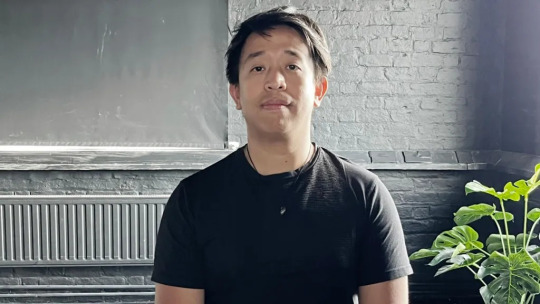
Andrew Kaung says he raised concerns that teenage boys were being pushed violent, misogynistic content
When he worked at Meta between 2019 and December 2020, Andrew Kaung says there was a different problem. He says that, while the majority of videos were removed or flagged to moderators by AI tools, the site relied on users to report other videos once they had already seen them.
He says he raised concerns while at both companies, but was met mainly with inaction because, he says, of fears about the amount of work involved or the cost. He says subsequently some improvements were made at TikTok and Meta, but he says younger users, such as Cai, were left at risk in the meantime.
Several former employees from the social media companies have told the BBC Andrew Kaung’s concerns were consistent with their own knowledge and experience.
Algorithms from all the major social media companies have been recommending harmful content to children, even if unintentionally, UK regulator Ofcom tells the BBC.
“Companies have been turning a blind eye and have been treating children as they treat adults,” says Almudena Lara, Ofcom's online safety policy development director.
'My friend needed a reality check'
TikTok told the BBC it has “industry-leading” safety settings for teens and employs more than 40,000 people working to keep users safe. It said this year alone it expects to invest “more than $2bn (£1.5bn) on safety”, and of the content it removes for breaking its rules it finds 98% proactively.
Meta, which owns Instagram and Facebook, says it has more than 50 different tools, resources and features to give teens “positive and age-appropriate experiences”.
Cai told the BBC he tried to use one of Instagram’s tools and a similar one on TikTok to say he was not interested in violent or misogynistic content - but he says he continued to be recommended it.
He is interested in UFC - the Ultimate Fighting Championship. He also found himself watching videos from controversial influencers when they were sent his way, but he says he did not want to be recommended this more extreme content.
“You get the picture in your head and you can't get it out. [It] stains your brain. And so you think about it for the rest of the day,” he says.
Girls he knows who are the same age have been recommended videos about topics such as music and make-up rather than violence, he says.

Cai says one of his friends became drawn into content from a controversial influencer
Meanwhile Cai, now 18, says he is still being pushed violent and misogynistic content on both Instagram and TikTok.
When we scroll through his Instagram Reels, they include an image making light of domestic violence. It shows two characters side by side, one of whom has bruises, with the caption: “My Love Language”. Another shows a person being run over by a lorry.
Cai says he has noticed that videos with millions of likes can be persuasive to other young men his age.
For example, he says one of his friends became drawn into content from a controversial influencer - and started to adopt misogynistic views.
His friend “took it too far”, Cai says. “He started saying things about women. It’s like you have to give your friend a reality check.”
Cai says he has commented on posts to say that he doesn’t like them, and when he has accidentally liked videos, he has tried to undo it, hoping it will reset the algorithms. But he says he has ended up with more videos taking over his feeds.

Ofcom says social media companies recommend harmful content to children, even if unintentionally
So, how do TikTok’s algorithms actually work?
According to Andrew Kaung, the algorithms' fuel is engagement, regardless of whether the engagement is positive or negative. That could explain in part why Cai’s efforts to manipulate the algorithms weren’t working.
The first step for users is to specify some likes and interests when they sign up. Andrew says some of the content initially served up by the algorithms to, say, a 16-year-old, is based on the preferences they give and the preferences of other users of a similar age in a similar location.
According to TikTok, the algorithms are not informed by a user’s gender. But Andrew says the interests teenagers express when they sign up often have the effect of dividing them up along gender lines.
The former TikTok employee says some 16-year-old boys could be exposed to violent content “right away”, because other teenage users with similar preferences have expressed an interest in this type of content - even if that just means spending more time on a video that grabs their attention for that little bit longer.
The interests indicated by many teenage girls in profiles he examined - “pop singers, songs, make-up” - meant they were not recommended this violent content, he says.
He says the algorithms use “reinforcement learning” - a method where AI systems learn by trial and error - and train themselves to detect behaviour towards different videos.
Andrew Kaung says they are designed to maximise engagement by showing you videos they expect you to spend longer watching, comment on, or like - all to keep you coming back for more.
The algorithm recommending content to TikTok's “For You Page”, he says, does not always differentiate between harmful and non-harmful content.
According to Andrew, one of the problems he identified when he worked at TikTok was that the teams involved in training and coding that algorithm did not always know the exact nature of the videos it was recommending.
“They see the number of viewers, the age, the trend, that sort of very abstract data. They wouldn't necessarily be actually exposed to the content,” the former TikTok analyst tells me.
That was why, in 2022, he and a colleague decided to take a look at what kinds of videos were being recommended to a range of users, including some 16-year-olds.
He says they were concerned about violent and harmful content being served to some teenagers, and proposed to TikTok that it should update its moderation system.
They wanted TikTok to clearly label videos so everyone working there could see why they were harmful - extreme violence, abuse, pornography and so on - and to hire more moderators who specialised in these different areas. Andrew says their suggestions were rejected at that time.
TikTok says it had specialist moderators at the time and, as the platform has grown, it has continued to hire more. It also said it separated out different types of harmful content - into what it calls queues - for moderators.
'Asking a tiger not to eat you'
Andrew Kaung says that from the inside of TikTok and Meta it felt really difficult to make the changes he thought were necessary.
“We are asking a private company whose interest is to promote their products to moderate themselves, which is like asking a tiger not to eat you,” he says.
He also says he thinks children’s and teenagers’ lives would be better if they stopped using their smartphones.
But for Cai, banning phones or social media for teenagers is not the solution. His phone is integral to his life - a really important way of chatting to friends, navigating when he is out and about, and paying for stuff.
Instead, he wants the social media companies to listen more to what teenagers don’t want to see. He wants the firms to make the tools that let users indicate their preferences more effective.
“I feel like social media companies don't respect your opinion, as long as it makes them money,” Cai tells me.
In the UK, a new law will force social media firms to verify children’s ages and stop the sites recommending porn or other harmful content to young people. UK media regulator Ofcom is in charge of enforcing it.
Almudena Lara, Ofcom's online safety policy development director, says that while harmful content that predominantly affects young women - such as videos promoting eating disorders and self-harm - have rightly been in the spotlight, the algorithmic pathways driving hate and violence to mainly teenage boys and young men have received less attention.
“It tends to be a minority of [children] that get exposed to the most harmful content. But we know, however, that once you are exposed to that harmful content, it becomes unavoidable,” says Ms Lara.
Ofcom says it can fine companies and could bring criminal prosecutions if they do not do enough, but the measures will not come in to force until 2025.
TikTok says it uses “innovative technology” and provides “industry-leading” safety and privacy settings for teens, including systems to block content that may not be suitable, and that it does not allow extreme violence or misogyny.
Meta, which owns Instagram and Facebook, says it has more than “50 different tools, resources and features” to give teens “positive and age-appropriate experiences”. According to Meta, it seeks feedback from its own teams and potential policy changes go through robust process.
#Teenage boys and violent social media#Teenage boys and misogynistic social media#Algorithms#Teenage girls and social posts about makeup#TikTok#Meta
19 notes
·
View notes
Text
for my followers living in the UK
this is outside the topics of what I normally post, but i was pissed off so I'm posting it
I'm guessing a lot of people's parents/family members watch GB news right? me personally i get really pissed off when my dad puts it on because I just cant stand them - its just daily mail readers allowed to go on tv
my teacher even told me that to get away with fines from ofcom they class themselves as an "entertainment" channel despite them having news in the name - so they can call themselves a news channel, say incredibly biased things and when ofcom tries to fine them for it they can say "its just entertainment!! its just peoples opinions!!" well karen a hallmark of good journalism is not being biased and not letting opinions influence the news you report
i found this amazing website with reasons to boycott gb news, a list of advertisers that give them money, and the people who fund, own, and star on the channel. please share it!
#uk#the uk is getting worse#uk politics#trans rights#united kingdom#politics#uknews#uk news#ukpolitics#tories#tory#fuck tories#fuck conservatives#survive out of spite#daily mail#daily fail#gbnews#gb news
6 notes
·
View notes
Text
Submit a formal complaint about coverage of the Zionist riots in Amsterdam
It's never a surprise when Western media shows its bias against Palestine, but it's particularly disgusting when they make it clear it's deliberate. Such is the case with Sky News in Britain, which initially reported on the recent violence by Israeli football fans in an accurate and impartial manner before removing that report and republishing an edited form, which notably lacked key details and context so as to portray the Zionist aggressors as victims.
Britain's Palestine Solidarity Campaign is submitting a formal complaint to Ofcom, the British media regulator, and every name backing it will help.
6 notes
·
View notes
Text
Bereaved families are calling on the online regulator Ofcom to shut down a "vile" website which promotes videos of the deaths of their loved ones.
The website, which we are not naming, has more than three million members and contains thousands of graphic photos and videos of real-life killings and suicides as well as executions carried out by extremists. Past members include those who have gone on to commit school shootings and murders, the BBC can reveal.
From Monday, Ofcom gets new powers to crack down on illegal content, but it may not be enough to close the site.
The site's admin team have said they would give their "full attention" to any Ofcom requests.
Under the Online Safety Act, the regulator can now take action over illegal content and that includes videos promoting terrorism or banned extremist groups.
All websites will now have to show they have systems in place to remove illegal material. If they fail to do so, the regulator can get court orders to block platforms or impose fines of up to £18m.
And from the summer all sites must have robust age verification systems to prevent children accessing a range of content.
But critics believe the legislation itself is weak and that Ofcom is not being robust enough in how it plans to police sites.
Mike Haines' brother David was murdered by members of the Islamic State (IS) group in Syria in 2014. The full uncensored video of his killing is on the site.
Mr Haines says the website is "vile" and describes the content on it as "horrifying". He points out there is no effective age verification and worries about the impact on children.
"It's like a drug," he says, "once you've had your first taste, you want another taste.
"So you want to see more, and it becomes more violent and more graphic and more disgusting".
David Haines' daughter, Bethany, says the comments on the videos are horrendous. "For years I have been trying to keep track and report sites such as this one. I have a fear that my son will one day see the video of his grandfather."
Mr Haines says the authorities must act now. "Every second that we delay in shutting this site down, we are endangering our youth."
Ofcom has spent the past 18 months since the Online Safety Act was passed drawing up the codes of practice that platforms have to follow.
The regulator can now start to exercise its powers to investigate and fine platforms for hosting illegal material.
Videos on the website are categorised into groups, which include executions by extremist groups as well as people being burned alive, decapitated by passing cars and crushed by trains.
Although violent and distressing, not all videos on the site would be deemed illegal.
Experts are concerned that viewing such content normalises extreme violence and helps in the radicalisation of young people.
BBC research into user names on the site has also identified a number of known online extremists, including two people who recently carried out school shootings in the US.
Last December, 15-year-old Natalie Rupnow killed two and injured six at her conservative Christian school, in Madison, Wisconsin.
And in January, 17-year-old Solomon Henderson opened fire in a school cafeteria in Antioch, Tennessee, killing one student and injuring another before turning the gun on himself.
Both were members of the website, which offers a "school shooting compilation" video.
In the UK, it's known that Nicholas Prosper, 19, who pleaded guilty to killing his mother and two siblings, was also a member of the site.
When he was arrested by police in September last year a shotgun and 30 cartridges were found nearby. It's thought he was planning to carry out an attack at his old primary school in Luton.
Prosper had an interest in mass shootings, including the 1999 Columbine High School massacre, one of the most infamous massacres in the US.
Dr Olivia Brown, who studies radicalisation and extremism at the University of Bath, says repeated viewing of these kinds of videos, especially school shootings, desensitises users.
"What might have seemed like an impossible solution to what someone might be feeling, would then become something that might feel like a viable option," she says.
The site is also deeply distressing for grieving families.
A video of base jumper Nathan Odinson has been put in the "falling" category of the website by site administrators.
The 33-year-old from Cambridgeshire was an experienced skydiver, but died when his parachute failed to open after jumping from a 29-storey tower in Pattaya, Thailand, last year.
A Thai friend was filming at the time and the video was posted first on local social media.
"Nathan was a family member that we loved," said his brother Ed Harrison.
"I found it amazing, literally, that people could be so half-witted as to share that video. I don't suppose these forum members have such thoughts in respect to their own family members."
Another video on the site shows Ian Price who died in hospital after he was attacked by two XL Bullies in September 2023.
From today Ofcom says platforms must have systems in place to remove illegal content.
"We won't hesitate to take enforcement action where necessary against platforms that fall short."
The challenge for Ofcom is that the death website is hosted in the US and its owner and administrators remain anonymous.
Ofcom told us "this content is deeply disturbing".
In a statement, the website's admin team said it "routinely receives reports from many government agencies and industry watchdogs".
It said any reports from Ofcom "will have our full attention".
5 notes
·
View notes
Text

BBC Conservative Party Bias Serious Lack Of Impartiality - ‘The available evidence indicates the BBC has been giving significantly more airtime and more favourable coverage to the Conservative Party and its leadership contest compared to the Labour Party and its leader Keir Starmer in its morning and other news broadcasts.’ #CorruptToryGovernment #Elections #Electioneering #AI #Perplexity Llewelyn Pritchard 30 April 2024
Perplexity: ‘Based on the search results provided, the BBC does not appear to be giving equal airtime to the Labour Party in its morning broadcasts compared to the Conservative Party:
The Ofcom report found that the Conservative leadership contest was the most prominent specific topic across BBC news outlets, accounting for up to 47.2% of airtime on Newsnight and around 20% on other major BBC TV news programs.1
In contrast, the report found that health, education and crime topics only accounted for 7.5% of BBC airtime 1
The YouGov survey data suggests the public perceives the BBC as being more favourable towards the Conservatives and the right compared to Labour and the left. 5
So in summary, the available evidence indicates the BBC has been giving significantly more airtime and more favourable coverage to the Conservative Party and its leadership contest compared to the Labour Party and its leader Keir Starmer in its morning and other news broadcasts. 1 4 5’
BBC Conservative Party Bias Serious Lack Of Impartiality ‘The available evidence indicates the BBC has been giving significantly more airtime and more favourable coverage to the Conservative Party and its leadership contest compared to the Labour Party and its leader Keir Starmer in its morning and other news broadcasts.’ #BBC #CorruptToryGovernment #Electioneering #AI #Perplexity Llewelyn Pritchard 30 April 2024
Samir Shah Non-Executive Chairman
Damon Buffini Deputy Chair; Chair, BBC Commercial Board
Consisting of four executive members:
i) Tim Davie - Director-General and Editor-in-Chief, who also chairs the
Executive Committee. 1
ii) Charlotte Moore, Chief Content Officer. 1
iii) Leigh Tavaziva, Chief Operating Officer. 1
iv) Deborah Turness - CEO, BBC News and Current Affairs. 1
Four of the non-executive members are specifically appointed as members for each of the nations of the UK:
i) Robbie Gibb, Member for England
iia) Dame Elan Closs Stephens DBE, ‘Former Acting Chair; Former Member for Wales’
iib) Rhodri Talfan Davies, Director of Nations and sits on the BBC’s Executive Committee
iii) Muriel Gray, Member for Scotland
iv) Michael Smyth, Member for Northern Ireland
The Chairman and the non-executive members for the nations are appointed by HM The King on the recommendation of Ministers while the other members of the Board are appointed by the BBC through the Board’s Nominations Committee.’
Source: https://www.bbc.com/aboutthebbc/whoweare/bbcboard
Perplexity
‘Member ID of the BBC Executive Committee, which is responsible for the day-to-day management and operations of the BBC who have likely or potential vulnerabilities to Tory Government interference 1 2 3 5’:
Tim Davie, Director-General and Editor-in-Chief
Appointed: 1 September 2020
‘there is evidence that Tim Davie, the current Director-General and Editor-in-Chief of the BBC, has had past political affiliations with the Conservative Party:
Involvement with the Conservative Party in the 1990s:
Davie "stood as a councillor for The Conservative Party in Hammersmith in 1993 and 1994." 1
He was also "deputy chairman of the Hammersmith and Fulham Conservative party in the 1990s." 1
Connections to Conservative Politicians:
Davie "remains good friends with the Tory peer Stephen Greenhalgh, who was until last year a minister in Johnson's government, and who celebrated Davie's appointment in a tweet in 2020." 2 3
Kerris Bright, Chief Customer Officer
"previously stood as a councillor for The Conservative Party in Hammersmith in 1993 and 1994."4 This suggests she had some past involvement with the Conservative Party, though the extent and nature of her political activities are not elaborated upon.’
Potential Ideological Alignment:
Kerris Bright's background in marketing and customer-focused roles at companies like Virgin Media and British Airways may align, to some degree, with the Conservative Party's generally pro-business and free market-oriented policies.’
Alan Dickson - Chief Financial Officer
Registered Donation to the Conservative Party:
According to the Register of Members' Financial Interests, Alan Dickson made a registered donation to the Conservative Party in the past. 3
The register states that the "Amount of donation: £5,000" and the "Address of donor: private". 3
Leigh Tavaziva, Chief Operating Officer
Joined the BBC as Group Chief Operating Officer in February 2021. 1
’Former Conservative Candidate: According to the transcript from the Digital, Culture, Media and Sport Committee hearing, it was "pointed out that you are a former Conservative candidate". 2
Tom Fussell, CEO, BBC Studios
Potential Ideological Alignment:
As the CEO of BBC Studios, a commercial subsidiary of the BBC, Tom Fussell's focus on the financial and business aspects of the organisation may align, to some degree, with the Conservative Party's generally pro-business policies.
Alice Macandrew, Group Corporate Affairs Director
‘Alice Macandrew previously worked as an adviser to James Murdoch, who had close ties to the Conservative Party. 4 This represents her past, indirect connection to the party through her professional association.’
Charlotte Moore, Chief Content Officer
First joined the BBC in 2006 as a Commissioning Executive, and over the years took on increasingly senior roles within the organisation, culminating in her appointment as Chief Content Officer in September 2020.
‘Criticism of Conservative Government Policies:
In 2016, when Charlotte Moore was the Controller of BBC One, she publicly defended the BBC's programming against criticism from the then-Conservative Culture Secretary, John Whittingdale.3 This suggests a potential tension or disagreement between Moore and the Conservative government's views on the BBC's content.’
Uzair Qadeer, Chief People Officer
The search results do not contain any information about Uzair Qadeer having any direct, indirect, past, or present connections to the Conservative Party or any other political party. 1 2 3 4 5
Gautam Rangarajan, Group Director of Strategy and Performance
Potential Ideological Alignment:
Given Rangarajan's senior position at the BBC, overseeing strategy and performance, his work may align to some degree with the Conservative Party's views on the role and operations of the public broadcaster. However, the search results do not provide any explicit evidence of him actively supporting or promoting Conservative Party policies or agendas.
Rhodri Talfan Davies, Director, Nations
Potential Ideological Alignment:
As the Director of Nations at the BBC, Rhodri Talfan Davies may have some indirect connections or alignment with the Conservative Party's views on the role and operations of the public broadcaster, particularly in relation to serving local and regional audiences. However, the search results do not provide any explicit evidence of him actively supporting or promoting Conservative Party policies or agendas.
Deborah Turness, CEO, BBC News and Current Affairs
Joined the BBC for the first time in September 2022 when she was appointed as the CEO of BBC News and Current Affairs.
‘The indirect connections between Deborah Turness and the Conservative Party seem to be limited to her past criticism of the party as a journalist, her testimony before a parliamentary committee, and her current leadership role at the BBC, which could potentially influence the corporation's relationship with the governing party. However, the search results do not contain any direct evidence of Turness having formal political affiliations or connections with the Conservatives.’
Ref. Current members of the BBC Executive Board:
‘Significance of the Culture, Media and Sport Select Committee's serious reservations about Dr. Samir Shah's appointment as BBC chair:
Doubts about his Willingness to Challenge BBC Leadership: The committee expressed "serious reservations" about Dr. Shah's "willingness to offer his opinions and insight on some of the most fundamental issues facing the corporation, and his ability to provide the robust challenge that the BBC leadership requires at this time." 1 2 4 5 They felt he did not demonstrate the necessary "strength and character" to hold the BBC's executive leadership accountable. 2 4
Concerns over his Evasiveness on Key Issues: The committee was "disappointed that Dr Shah was not willing to express a view on fundamental principles, such as board level interference in the BBC and other bodies and on political impartiality." 1 2 4 5 When asked about allegations of interference by a BBC board member, Dr. Shah was evasive and said he would need to wait until he was in post to comment. 2 4
Doubts about his Ability to Protect BBC's Independence: As BBC chair, Dr. Shah would be responsible for "upholding and protecting the BBC's independence and ensuring the BBC fulfils its mission to inform, educate and entertain." 1 5 The committee's reservations about his willingness to challenge the leadership and address fundamental issues raised concerns about his ability to effectively carry out this role.
Potential Impact on BBC's Future: The BBC is facing significant challenges, including funding cuts and political pressure. 3 The committee's doubts about Dr. Shah's suitability for the role at this "challenging time for the BBC"3 suggest they are concerned about his ability to navigate these issues and protect the corporation's integrity and independence.
In summary, the select committee's reservations highlight significant doubts about Dr. Shah's readiness and willingness to provide the robust, independent oversight required of the BBC chair, which is a crucial role in safeguarding the BBC's future and its ability to fulfil its public service mission. 1 2 4 5’
DeepAI:
‘The Culture, Media and Sport Select Committee's serious reservations about Dr. Samir Shah's appointment as BBC chairman carry significant weight due to the important role of the BBC in the media landscape and the need for transparent and effective governance:
1. Validity:
The reservations raised by the Select Committee may be considered valid if they are grounded in legitimate concerns about Dr. Shah's qualifications, experience, or potential conflicts of interest.
Valid reservations could indicate that there are genuine issues that need to be addressed regarding Dr. Shah's suitability for the role.
The Committee's scrutiny helps ensure that the selection process for key leadership positions like the BBC chairman is fair, transparent, and based on merit.
Valid concerns highlight the importance of selecting individuals with the skills and capabilities necessary to lead a complex and influential organisation like the BBC.
2. Reliability:
The reliability of the Select Committee's reservations depends on the thoroughness and fairness of their assessment of Dr. Shah's appointment.
A reliable evaluation takes into account all relevant factors and is based on objective criteria rather than personal biases or unrelated considerations.
The Select Committee's role in scrutinising public appointments is a key aspect of its function in upholding the principles of good governance and accountability.
Reliable reservations indicate that the Committee is fulfilling its oversight responsibilities effectively and working to ensure the integrity of the BBC's leadership structure.
Overall, the valid and reliable significance of the Culture, Media and Sport Select Committee's reservations about Dr. Samir Shah's appointment as BBC chairman lies in their potential to safeguard the BBC's governance processes, uphold standards of transparency and meritocracy and promote public trust in the organisation's leadership.
By raising and addressing these reservations, the Committee contributes to maintaining the BBC's credibility and effectiveness in fulfilling its public service remit.’
‘Possible vulnerabilities to government interference within the BBC Executive Committee could stem from individuals with close political affiliations, personal relationships, or previous government roles.
These vulnerabilities could compromise the BBC's independence and impartiality. Here are some examples:
Trust: If a member of the Executive Committee has a history of close personal or professional relationships with government officials, there may be concerns about their ability to act independently. For example, if a member has recently worked for a political party or has strong ties to a specific government figure, their decisions and actions within the BBC may be viewed as potentially biased.
Political Affiliations: Executive Committee members with overt political affiliations or biases may be more susceptible to government interference. For instance, if a member has publicly supported a particular political party, there could be concerns that their decisions at the BBC might align with that party's interests rather than with the impartiality expected of the organisation.
Past Government Roles: Individuals within the Executive Committee who have previously held prominent positions within governmental bodies may be seen as more susceptible to government influence. For example, if a member has served as a government advisor or in a ministerial role, there may be worries about their loyalties and potential conflicts of interest when making decisions that affect the BBC.
Ideological Alignment: Executive Committee members whose personal beliefs or ideologies closely mirror those of a ruling government may face suspicion about their ability to act independently. If a member's values and viewpoints consistently align with a specific government's policies, their decision-making within the BBC could be questioned for potential bias.
It is crucial for the BBC Executive Committee to prioritise independence, impartiality, and the public interest in its decision-making processes.
Members who exhibit vulnerabilities to biased government interference may undermine the BBC's integrity and reputation as a trusted and impartial public broadcaster.
Transparent processes for appointment, accountability mechanisms, and a commitment to upholding the BBC's editorial independence are essential to mitigate these vulnerabilities and safeguard the BBC's role as a trusted source of information and entertainment for the public.’
Links
https://www.linkedin.com/pulse/bbc-conservative-bias-serious-lack-impartiality-llewelyn-pritchard-ma-jjxye/ https://docs.google.com/document/d/e/2PACX-1vSkyykETIPF7_5HmsFjZF-gQD9H9eKPG_PO_mhiR9WC72ovi8Klf0DntHvTEQ6wpNBhJu0Dxuakk8VQ/pub BBC Conservative Bias Serious Lack Of Impartiality - ‘The available evidence indicates the BBC has been giving significantly more airtime and more favourable coverage to the Conservative Party and its leadership contest compared to the Labour Party and its leader Keir Starmer in its morning and other news broadcasts.’ #CorruptToryGovernment #Elections #Electioneering #AI #Perplexity Llewelyn Pritchard 30 April 2024
https://www.linkedin.com/pulse/indian-strongmans-belly-power-rules-bbc-llewelyn-pritchard-ma-lvcve/ https://docs.google.com/document/d/e/2PACX-1vSMe8-WjX1OW7pN6Z6cXW6lq7xIA6CCmBv0ERe3h1eO--o3OLKuhAAFMv5kARFizBOvgYy8WLWYY-KP/pub 'Indian Strongman's Belly-Power Rules BBC' #DeepAIGeneratedImage #PoliticalSatire Fishy Rishi Tiddly Trudeau Artworks Llewelyn Pritchard 19 March 2024
2 notes
·
View notes
Text
Victoria Murphy in Town & Country on 01 March 2024:
While the internet may be something of a wild west, when it comes to reporting by credible media organizations in the UK, there are clear guidelines on individual’s right to privacy. For newspapers and magazines, this is specifically protected in the UK’s Editors’ Code of Practice. “Everyone is entitled to respect for their private and family life, home, physical and mental health, and correspondence, including digital communications,” the code states. In a clause on hospitals, the guide states, “The restrictions on intruding into privacy are particularly relevant to enquiries about individuals in hospitals or similar institutions.” UK broadcasters abide by Ofcom regulations, which contain a section on privacy guidance. “Any infringement of privacy in the making of a programme should be with the person’s and/or organisation’s consent or be otherwise warranted,” the guide states.
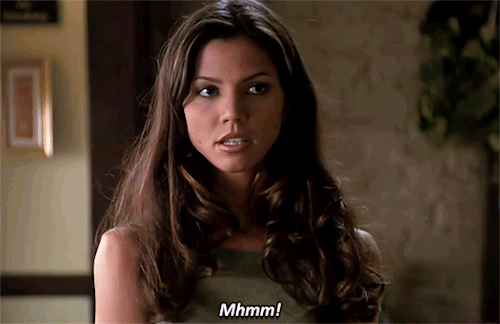
Dominic Ponsford in the (UK) Press Gazette on 05 March 2024:
No UK media have used a paparazzi image of Kate, the Princess of Wales, observing a long-held convention not to use such pictures. The image was taken by a photographer for Backgrid (which was bought by Shutterstock last month) and was published in the UK on celebrity news website TMZ. Whereas most UK news publications adhere to the Editors’ Code, US publications do not and are used to a legal framework where the First Amendment (guaranteeing freedom of expression) tends to trump the right to privacy. In the UK, the right to privacy is well established and the publication of images such as this one would need to be justified in the public interest. Kate has not been photographed in public since she underwent abdominal surgery on 16 January, prompting widespread speculation on social media about her health. The Editors’ Code, which underpins the work of press regulator IPSO, states: “Everyone is entitled to respect for their private and family life, home, physical and mental health, and correspondence, including digital communications.” It states that it is unacceptable to photograph people without their consent in public places where there is a reasonable expectation of privacy. The photograph in question, which is grainy and looks to have been taken with a long lens, shows the Princess on a private car journey being driven by her mother. Vice-chair of the National Association of Press Agencies Mike Leidig said: “By long arrangement with Buckingham and Kensington Palaces, the British media agrees not to intrude into areas, such as health, which could be considered sensitive. In return, they are kept up to date off the record. “There is also the IPSO Editors’ Code clause on privacy, which binds the British media to show restraint and sensitivity to people undergoing medical treatment, even if they appear to be in a public place where anyone could see them. “Having said that, there does seem to be an anomaly where the British public has to remain in the dark about the Princess of Wales’s recovery while readers in America, or anyone with internet access can see it for themselves. It was running on X almost within seconds.” Camilla Tominey, an associate editor of the Daily Telegraph covering politics and the Royal Family, said: “My understanding is no newspaper is running them in the UK because they are deemed a breach of privacy and there’s no longer a market for paparazzi photographs of the Royals in the wake of the death of Diana, Princess of Wales and the Leveson Inquiry.” And executive director of the Society of Editors Dawn Alford said: “The decision by the UK press not to publish the paparazzi photos of Kate Middleton is an example of responsible journalism. Kensington Palace has asked that the Princess of Wales be allowed to recover in private following her operation and UK newsrooms are respecting this.” Agency Backgrid which took the Kate image was involved in an incident in New York last May when Prince Harry said he and his wife Meghan were chased around the city by paparazzi photographers.
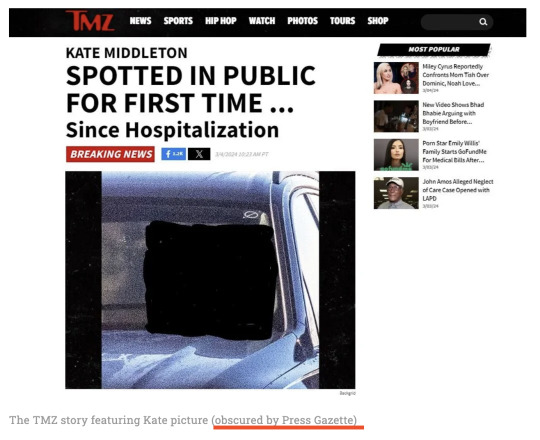
Let's not forget--as Richard Palmer pointed out--that Kate was photographed on a public road.

But as it was mentioned in the second to last paragraph in the Press Gazette, "Kensington Palace has asked that the Princess of Wales be allowed to recover in private following her operation and UK newsrooms are respecting this."
KENSINGTON PALACE is dictating that UK media not cover Kate. If it wasn't clear before today, it should be now that William decided to treat THE BRITISH ARMY as his public adversary.
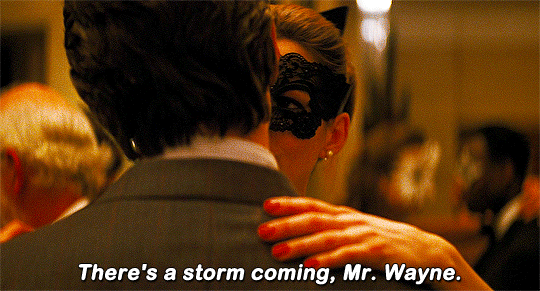
#media#uk#fleet street#paparazzi#pr games#strategery#Victoria Murphy#Dominic Ponsford#Camilla Tominey#Richard Palmer#pr fail#kensington palace#palace officials#William The Terrible#William The Weak#William The Prince of OWN GOALS#prince william#William The Prince of Wales#british royal family#kate middleton#Catherine The Princess of Wales
5 notes
·
View notes
Text
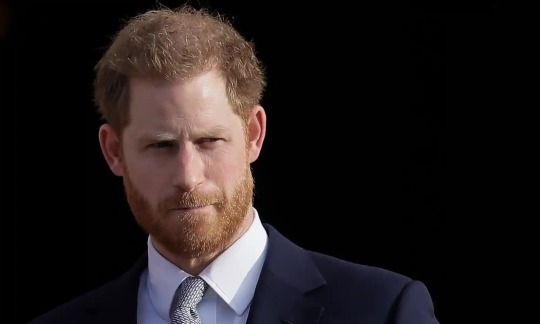
Analysis
Prince Harry privacy trial will be uncomfortable for Mail’s publisher
Alexandra Topping
Associated Newspapers had avoided being drawn into the scandal around practices faced by rivals. It will not relish the scrutiny in court
Fri 10 Nov 2023 19.38 CET
It is the moment that senior executives at the Mail have been dreading: on Friday Mr Justice Nicklin ruled that the case brought against their publisher Associated Newspapers by Prince Harry, Elton John, Doreen Lawrence and others can continue.
The Daily Mail and the Mail on Sunday, which had so assiduously avoided being drawn into the scandal around newspaper practices faced by its rivals, will now be scrutinised in the high court and likely face weeks of difficult headlines, regardless of the outcome of the trial.
It is not a prospect that middle England’s newspaper will relish. Harry and co accuse it of bugging homes and cars, “blagging” phone, medical and financial records and breaking into private property. The claims were “preposterous smears”, Associated Newspapers said in October 2022, when the claims were filed.
A spokesperson said the lawsuit “appears to be nothing more than a pre-planned and orchestrated attempt to drag the Mail titles into the phone-hacking scandal concerning articles up to 30 years old”.
“These unsubstantiated and highly defamatory claims – based on no credible evidence – appear to be simply a fishing expedition by claimants and their lawyers, some of whom have already pursued cases elsewhere,” the spokesperson added.
The publisher’s lawyers had called for the entire case to be dismissed, saying it was outside a six-year time limit for legal action. But Nicklin swept that argument away on Friday, saying the claimants had “a real prospect” of showing unlawful acts were concealed and that they had been thrown “off the scent” by the newspaper’s own reporting and public statements.
But it is a partial victory only for Harry and his six co-claimants, who also include David Furnish, Sadie Frost, Liz Hurley and Simon Hughes. They suffered a significant blow when Nicklin ruled that their case could not use leaked copies of internal documents that were confidentially supplied by the Mail to the Leveson inquiry into the media in 2012. It was a “significant victory”, said the Mail’s publisher.
Many media watchers will agree. While the hacking cases that have embroiled Rupert Murdoch’s News UK and the Daily Mirror for the last 15 years dealt largely with the interception of voicemails, the allegations against Associated Newspapers appear to focus on the use of external private investigators.
The claimants argue the documents will come out at trial in due course and this aspect of the ruling is a pyrrhic victory for Associated Newspapers, adding: “If the Mail and the Mail on Sunday have nothing to hide … they should provide us with the ledgers voluntarily now.”
The case is likely to rely, to an extent, on the testimony of witnesses, some of whom already appear to be problematic. The celebrities’ lawyers said the private investigator Gavin Burrows, who both Harry and Lady Lawrence say was commissioned by the Mail to target them, provided evidence to them in 2021. But the court heard he later gave a signed witness statement “denying that he was commissioned or instructed by Associated to carry out any unlawful activity”.
“Mr Burrows has given two flatly contradictory statements to each side in this litigation,” said Nicklin in his judgment, a fact which he said could only be resolved at trial.
Many will ruminate on the implications of the ruling for Paul Dacre, editor of the Daily Mail for a quarter of a century and at the helm when these allegations are said to have taken place. Dacre, who pulled out of the running to be the next chair of the media regulator, Ofcom, in 2021 after concerns were raised about the transparency of the recruitment process, may not be able to avoid being dragged into the case, whether he wants to or not.
One outcome is sure: the legal bill will be eye-wateringly high – costing the Mail publisher as much as £5m if Harry and his co-complainants are successful at trial, according to Philippa Dempster, a privacy lawyer at Freeths. But it is the knock-on effect that is likely to be of greatest concern to Mail executives. News UK has paid hundreds of millions of pounds in costs and damages relating to phone hacking at the News of the World and the Sun: the Mail’s publishers will hope they can avoid a similar fate.
4 notes
·
View notes
Text
The UK’s sweeping online censorship law – the Online Safety Act – that will be enforced from March of next year is already claiming its first victims.
The new legislative landscape in the country is now not providing any kind of safety for hundreds of small websites, including non-profit forums, that will have to shut down, unable to comply with the act – specifically, faced with what reports refer to as “disproportionate personal liability.”
The fines go up to the equivalent of USD 25 million, while the law also introduces new criminal offenses.
Earlier in the week, the act’s enforcer, Ofcom, published dozens of measures that online services are supposed to implement by March 16, including naming a person responsible – and accountable – for making sure a site or platform complies.
8 notes
·
View notes
Text
Just adding that you can make a complaint to the BBC/ OFCOM about their news reports being bias. I'm paraphrasing from the Instagram account 'Bristolpalestinealliance' below, I'd suggest using this as starting point when sending a complaint (you can't copy paste from an IG image and I couldn't find a letter template anywhere so I thought this might be helpful to relay):
"I believe the BBC News has breached OFCOM Broadcasters Code Section 5: Due impartiality and due accuracy and undue prominence of views and opinions.
On Thursday, BBC News reports included links to live viewing of Israel's defence of itself at the ICJ, encouraging and facilitating viewing of the presentation.
However, on Wednesday, when South Africa presented the initial arguments concerning the charge of genocide against Israel, the BBC's broadcast and report didn't include links to access the live broadcast of the proceedings. This is blatent and clear bias."
The account I got this info from also stated:
"When you get a negative reply, escalate it to OFCOM directly."
You can make a complaint here:
https://www.bbc.co.uk/contact/complaints/make-a-complaint/#/Complaint
Let's flood the BBC with this please!!
Since western media (especial American) are working overtime to suppress South Africa's hearing and Yemeni voices I want you to keep these 3 points in mind:
Not 1 major American news outlet broadcasted the South Africa case hearing on Thursday, but they broadcasted Israel's case hearing, today, Friday 12/1/2024.
Yemen has repeatedly said that the Red Sea blockage is because it's following its duty to upload "Article 1 on the Convention on the Prevention and Punishment of the crime of Genocide" and IS NOT to "endanger the freedom of navigation in one of the world's most vital waterways" like Biden put it, in his statement.
Gaza Strip is still under severe bombardment. Don't allow yourself to get used to it. They just bombed an entire neighborhood in Khan Yunis which is a southern city! And as of recently the electricity has gone off in a hospital because gas has ran out.
28K notes
·
View notes
Text
📱 Online Safety Alert: 1 in 4 Kids Aged 5–7 Now Have Smartphones — Ofcom
A new Ofcom report has raised alarms: almost 25% of children aged 5 to 7 in the UK now own a smartphone. Yes, kids just starting school are already immersed in the digital world — often without the tools or maturity to navigate it safely.
🎥 Footage from John Wallis Academy in Kent shows groups of schoolchildren in the playground, all glued to their screens. It’s a common sight — but also a clear signal that online safety can no longer be an afterthought.
Here’s why this matters:
Children this young are vulnerable to inappropriate content, online predators, and social pressure.
Most parents have limited knowledge of digital monitoring tools.
Schools are now having to balance education with digital safeguarding.
🔐 This is a wake-up call to educators, parents, and policymakers: Digital literacy and online safety must start early — as early as phone ownership.
🧠 Working on a project or assignment related to online safety, child development, or digital policy? 👉 Get expert help from CIPD Assignment Help – tailored support for students and professionals working on safeguarding and education.
#onlineSafety#childProtection#digitalParenting#UKSchools#smartphoneUse#OfcomReport#earlyTechExposure#JohnWallisAcademy#CIPDAssignmentHelp#educationPolicy#screenTime#parentingTips#digitalWellbeing#safeguardingChildren
0 notes
Text
Social media are fun, no questions asked there but what is it in their core? Can we trust the social media at all? Or is it all just a government program to control all of us?
The answer is… well… it’s kinda complicated.

On paper, we have some rules – don’t want any strangers peeking at your posts – make your profile private and select only the best ones to be your subscribers; don’t leak your location – no photos next to your door, guys, come on; and god, I hope you all know about no bank information out here – keep those numbers from the back of your car secure. But what else is there? And who is actually responsible about online safety?
Of course, the masses will just scream “YOU ARE RESPONSIBLE FOR YOUR OWN SAFETY”. Easy here, not everything should be on our shoulders.

In the UK, government officials just recently decided that maybe they should step up and try to regulate the socials and as the result, Online Safety Act was issued.
The strongest protections in the Act have been designed for children. Platforms will be required to prevent children from accessing harmful and age-inappropriate content and provide parents and children with clear and accessible ways to report problems online when they do arise.
The Act will also protect adult users, ensuring that major platforms will need to be more transparent about which kinds of potentially harmful content they allow, and give people more control over the types of content they want to see.
So, judging on that quote, we still can see that even that regulation is kinda more about how platforms should keep the users safe and if they don’t, they will be overlooked by the government.

Again, in the UK OFCOM is the main institution to look over everything and regulate everything and they have issued the guidance for the platforms to follow – have their algorithms in check, hide harmful content, highlight more positive messages. It’s not only about protecting children, but about general awareness and mental health, safety of women and girls, preventing misinformation. So, if you have noticed that sometimes Instagram asks you if everything is okay after you looked into something sad, don’t worry, they are not spying on you. At least, no openly – they are trying to protect you and offer help.
But data? What about data? Here is the where everything is not that nice. Every our action here – is a numerous amount of data that now considered a new gold. And for gold there always will be some diggers.
Facebook. The biggest platform out in the Web, has experienced the biggest data breach in 2019 and even after two years, in 2021 it all resurfaced again. Millions, even billions of people have been hacked, their names, dates of birth, locations, preferences, information about gender, phone numbers, EVERYTHING has been stolen. That was and still remains the biggest data breach in the history. Where did all the data go? No one really knows and we can talk a lot about some conspiracies but the fact is – data is important. Keep is safe.
Don’t accept all the cookies from some random websites, check if the connection is secure and, honestly, just be aware of the “stranger danger” out in the Internet. Don’t chat to some stranger users on Roblox, don’t fall for Instagram scam “you can win a million if you tag a friend”, don’t be afraid to report any profile that looks a bit suspicious. Keep yourself safe here, and even platforms say you have nothing to worry about, don’t trust them so much. Don’t put all information about yourself on your page, maybe don’t even have your real name – think of some creative nickname and trust with your real name to only your friends and trusted people. And just enjoy your life here and even more, outside of the web ❤️
0 notes
Text
Week 5 : Digital Community & Fandom
The days when being a fan only meant watching your favorite show are long gone. Thanks to websites like TikTok, Reddit, and Twitter, fandom has become a full-time interactive sport.
Jenkins (2006) asserts that fans are contributing to the creation of content through live-tweeting, memes, and even storyline influence in this age of "participatory culture."

Love Island and other reality TV programs demonstrate the strength of these online communities. Fans do more than simply watch the drama play out. They also forecast plot points by examining editing styles, create voting campaigns for your favorite competitors and instantly make words into viral memes.
The producers does noticed it - According to research, reality TV teams now keep an eye on online responses similar to in-person focus groups, occasionally modifying their programming in response to popular conversations (Andrejevic, 2004). There's a good chance it was designed to break the internet.
However, this connectedness has huge drawbacks like the algorithms would want strong opinions for it to be carefully studied. Plus, it's difficult to distinguish between toxic behavior and passionate fandom.
The industry is beginning to take action. During the last season, Twitter’s safety features helped cut down Love Island-related harassment by 22% (Ofcom, 2022). Now, they’re offering post-season mental health support, social media training for new contestants, and clearer guidelines to encourage respectful online interactions.
At the end of the day, digital fandom is what we make it. These communities can be incredible spaces for creativity and connection, but only if we work to keep them inclusive and kind. After all, shouldn't fandom be about celebrating what we love rather than tearing others down?
References :
Andrejevic, M. (2004). Reality TV : the work of being watched. Rowman & Littlefield Publishers.
Jenkins, H., & ProQuest issuing body. (2006). Convergence culture : where old and new media collide. New York University Press.
Ofcom. (2022). Social media and online safety report. https://www.ofcom.org.uk/research-and-data
0 notes